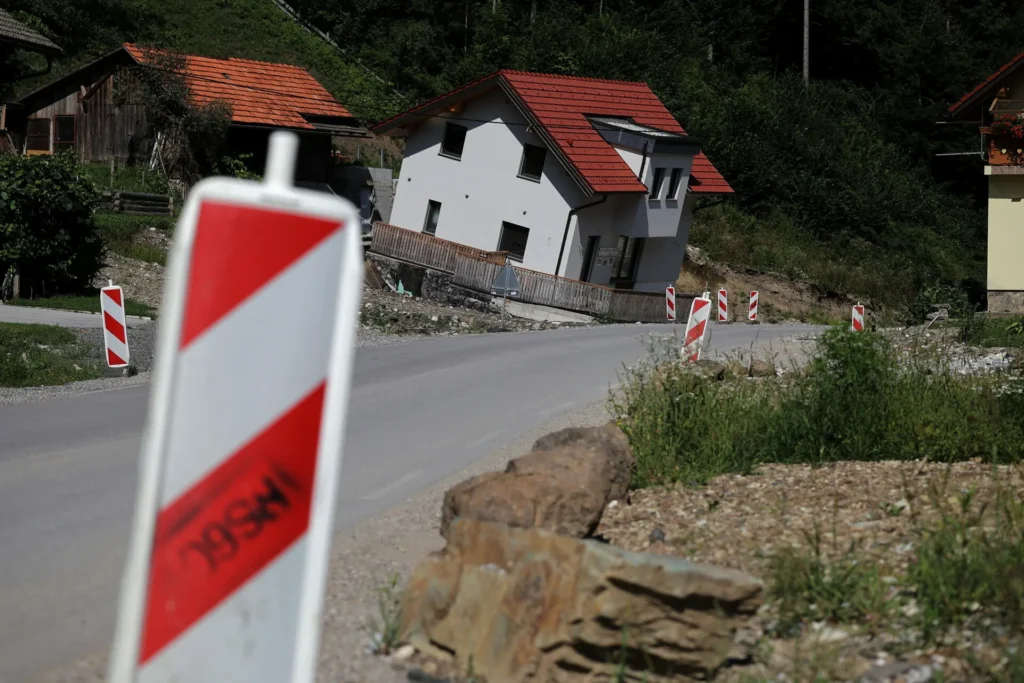Two years after the worst floods in the history of independent Slovenia, which happened in August of 2023 and claimed seven lives, as well as caused more than 3 billion euros in damage, the reality on the ground is sad and shameful. To date, the state has paid only a fraction of the aid promised, and many families still do not have their homes renovated, cannot build, or do not even know whether their house will be demolished or reconstructed. And the children of Mengeš still have no kindergarten and are in containers.
To date, the state has paid out only 64 million euros for the reconstruction of homes, which represents only a fraction of the needs. It is expected to disburse the rest over the next three years. In the meantime, many families are living in inadequate temporary solutions, not knowing whether they will be able to rebuild their homes or whether they will have to demolish them, and watching in silence as political promises are being broken.
In Mengeš, children are still in containers
A particular symbol of this inefficiency is the municipality of Mengeš, where more than 180 children have been attending kindergarten in modular container units for two years now. After being rescued from the flooded premises by the fire brigade in August 2023, they were supposed to be moved quickly to suitable alternative premises. But this did not happen, Planet TV reports.
Parents report inadequate conditions: poor ventilation, heat in summer, cold in winter, children eating their lunches with plastic cutlery on paper plates, and the playground being placed directly in front of a busy road. The children changed four different locations in the first year. Today, they are scattered in containers, a parish hall, a sports hall and a private house. The inspection by the Ministry of Education may not have found any irregularities, but it has admitted the obvious: the premises are too small for the number of children.
The Mayor: “Everything was promised, nothing was delivered.”
The Mayor of Mengeš, Bogo Ropotar, has publicly expressed his disappointment with the state’s behaviour. “We were promised by the state at the time of the floods that modular units would be built. Six months later, we were told that this solution would not be forthcoming – and then we were left to deal with this on our own.” The financial burden thus fell on the municipality, which secured the funding with its own resources, also due to some exceptional circumstances (including a 9-million-euro win by a citizen at Eurojackpot).
After more than a year and a half, construction of the new kindergarten is finally due to start at the end of August, and it will be completed by the end of next year. However, parents have pointed out that the new site is inferior to the previous one, as it is located in a less accessible area.
The Irmančnik family: trapped in their own house
The tragic reality is not present only among the youngest – many families who have lost their homes are still prisoners of the system. It was only in February this year that the Irmančnik family learned that their house was no longer slated for demolition, but for reconstruction. Iztok Irmančnik said: “We live in a flood zone. We cannot get a building permit for reconstruction because the area is officially unsafe. So, we are trapped in our own house, which we can neither repair nor sell. The state is offering us 17,000 euros, but we would have to invest at least twice as much.”
Golob: 100 houses a month; reality: one in two years
In the summer of 2023, Prime Minister Robert Golob confidently announced the rapid construction of prefabricated houses in cooperation with the country’s largest manufacturer. He promised to provide communal land and to start construction as soon as the water moved. Two years later, the government was only able to pose for the cameras in front of one house. And what is worse, this one house was not the result of state aid – it was built with contributions from more than 40 private donors. And the state has only added to the family’s expenses for the house, as they have to buy the land on which it stands for 70,000 euros.
Instead of aid – repayment of funds
In a further irony, 15 Slovenian municipalities now have to pay back some 16 million euros they received for rehabilitation, reports Planet TV. The reasons include administrative errors and unused funds that local authorities were unable to mobilise in time due to slow state procedures.
Karitas: We are still helping – because the state can’t
Slovenian Karitas is one of the few organisations that remains on the ground to provide psychosocial and material assistance. Andreja Verovšek told Planet TV: “The situation is still ongoing, although it is less often talked about in public. Some people are still afraid of any rain. Some people expected that their house would be rebuilt, but now they have found out that this is not possible. Uncertainty and unrest remain.”
Two years after water swept away homes, schools, hope and security, children still sit in containers, families live in houses that cannot be rebuilt, and thousands wait for decisions that are not there. Political announcements about quick and effective reconstruction have proved empty.
A. G.


